Player X is in the NHL. After home games, he has a routine. Typically, he'll meet a few teammates at a local restaurant for a late dinner. He likes to order steak after games -- medium rare, with a side salad and mashed potatoes. Then he'll go home.
Player X sometimes has a hard time unwinding; it was a day of unbounded stimulation. He woke up and arrived at the rink for a morning skate and meetings, went home to nap, returned to the arena for warm-ups (bright lights and eardrum-blasting music), then exerted his body for 20-something sub-one-minute shifts during which he shoves, sprints, reaches, shoots, gets hit and sometimes bleeds on the ice. By the time he gets home at night, he needs something to ease the process of getting to bed. So he'll often reach for his weed pen and take a few hits. "Just to relax," he says. "Honestly, it's the easiest and most natural way for me to fall asleep and be ready for the next day."
Because Player X is on a Western Conference team based in a state in which there are broad laws legalizing marijuana, he knows he's not doing anything wrong. Actually, he's doing what he estimates thousands of others who live in his city do every night as well.
And because he plays in the NHL -- and not, say, the NFL, NBA or MLB -- he knows he won't be punished.
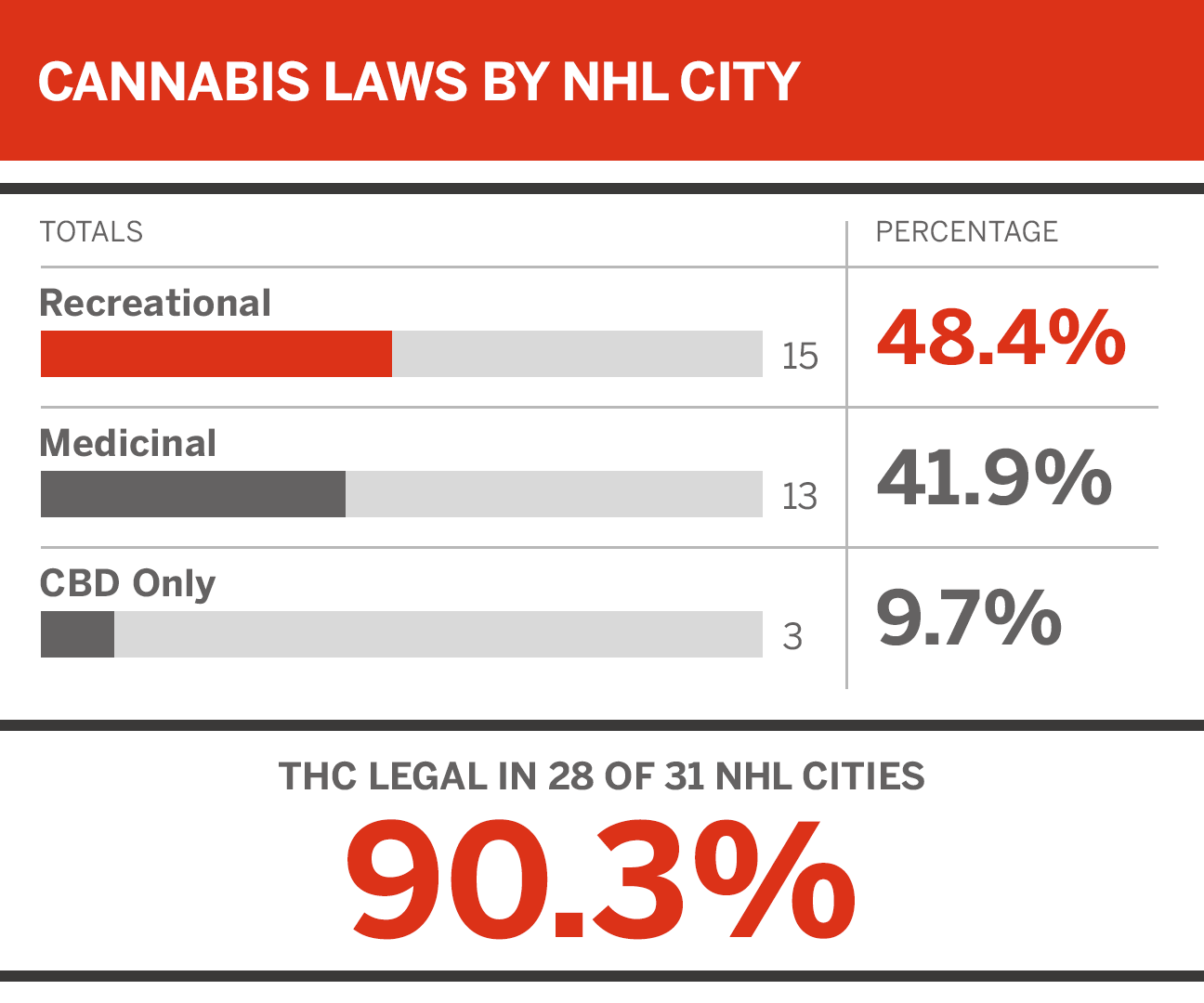
Evolving views
Society's views on marijuana are evolving -- fast. On Oct. 16, Canada became the largest country in the world to legalize recreational marijuana. Coupled with results from the midterm elections in the United States, this is the landscape: Of the 31 teams in the NHL, 28 play in states where players have access to legal marijuana, whether it is for medicinal or recreational purposes. That's the highest percentage (90.3) of any of the major four North American pro leagues, but hardly an anomaly.
This might surprise you: Of the 123 teams across MLB, the NBA, NHL and NFL, 45 play in states or provinces where recreational marijuana is legal (36.6 percent). Another 56 play in jurisdictions where medical marijuana is legal (45.5 percent). That's a whopping 82 percent of teams (101 of 123) that are playing in areas where their employees can legally purchase either medicinal or recreational marijuana.
In fact, the only places in which any of the four major pro league teams play where there are no broad laws legalizing marijuana are Indiana, Georgia, North Carolina, Tennessee, Texas and Wisconsin. That list could shrink soon.
Legislation for legalizing medical marijuana in North Carolina is expected this year. Recently elected Wisconsin Gov. Tony Evers advocated for legalizing medicinal marijuana on his official campaign website. There have been political hurdles in Texas, though a current bill on the table calls to decriminalize small amounts, which could open the door for more marijuana-friendly legislation. Even though bills in Nashville to decriminalize small amounts of marijuana were shot down by then-Gov. Bill Haslam, a new statewide bill is up for approval, proposing the same thing.
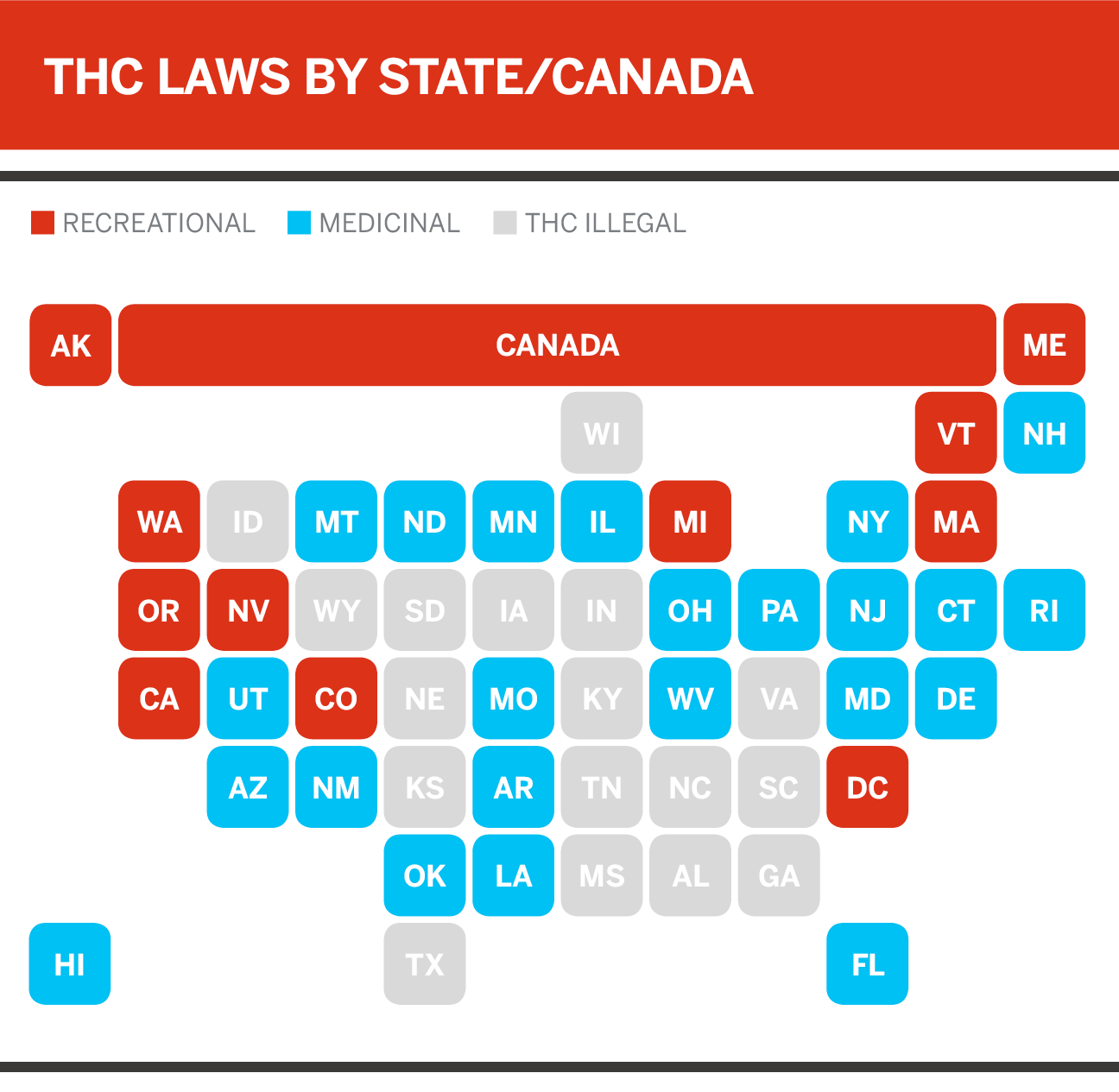
Yet drug policies in most of these leagues are still punishing players for consuming cannabis. All four drug policies are collectively bargained between the leagues and their respective players' unions.
Let's take a quick tour of NFL, MLB and NBA policies compared to the NHL's:
• NFL players with no previous violations are tested just once in the offseason. During the regular season, 10 players per team are randomly selected each week. A positive test means a referral to the substance abuse program. A second violation results in a fine of two game checks. A third violation is four game checks. The fourth violation is a four-game suspension. The fifth violation is a 10-game suspension, and the sixth violation results in a one-year banishment.
The league did relax its stance somewhat in 2014, when it upped the minimum levels for a positive test from 15 nanograms of THC per milliliter of blood or urine to 35 nanograms. Wide receiver Josh Gordon (currently suspended indefinitely) and Dallas Cowboys defensive end Randy Gregory (who went 616 days between regular-season games because of suspensions) are cautionary tales of what happens once you are flagged in the system.
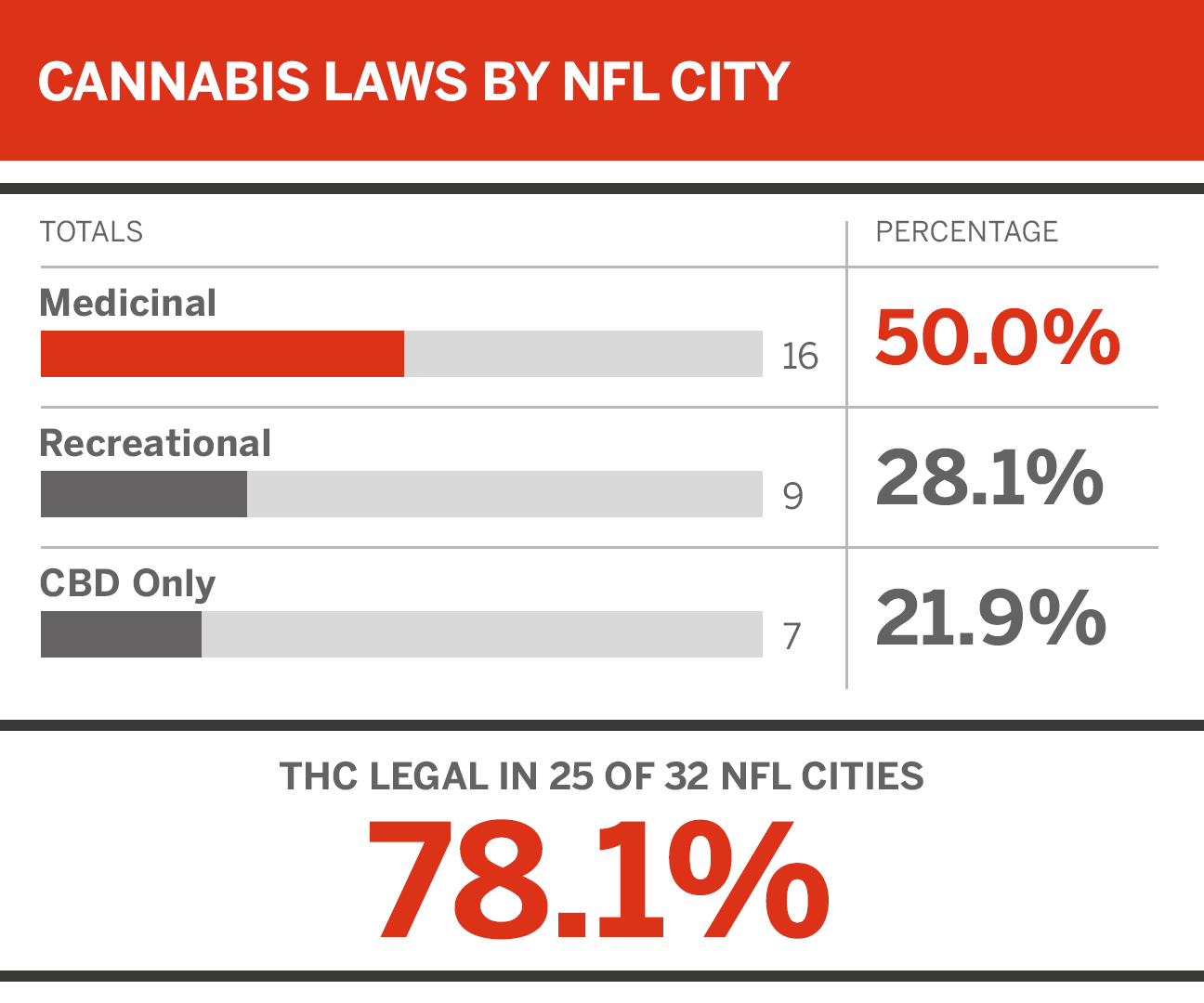
• The NBA does not test its players for marijuana in the offseason. Players are subject to four random tests during the regular season. A first positive test means a player must enter the marijuana program. The second positive test calls for a $25,000 fine. The third infraction is a five-game suspension, and five more games are added to each ensuing violation (10 games for a fourth positive test, 15 games for a fifth, etc.).
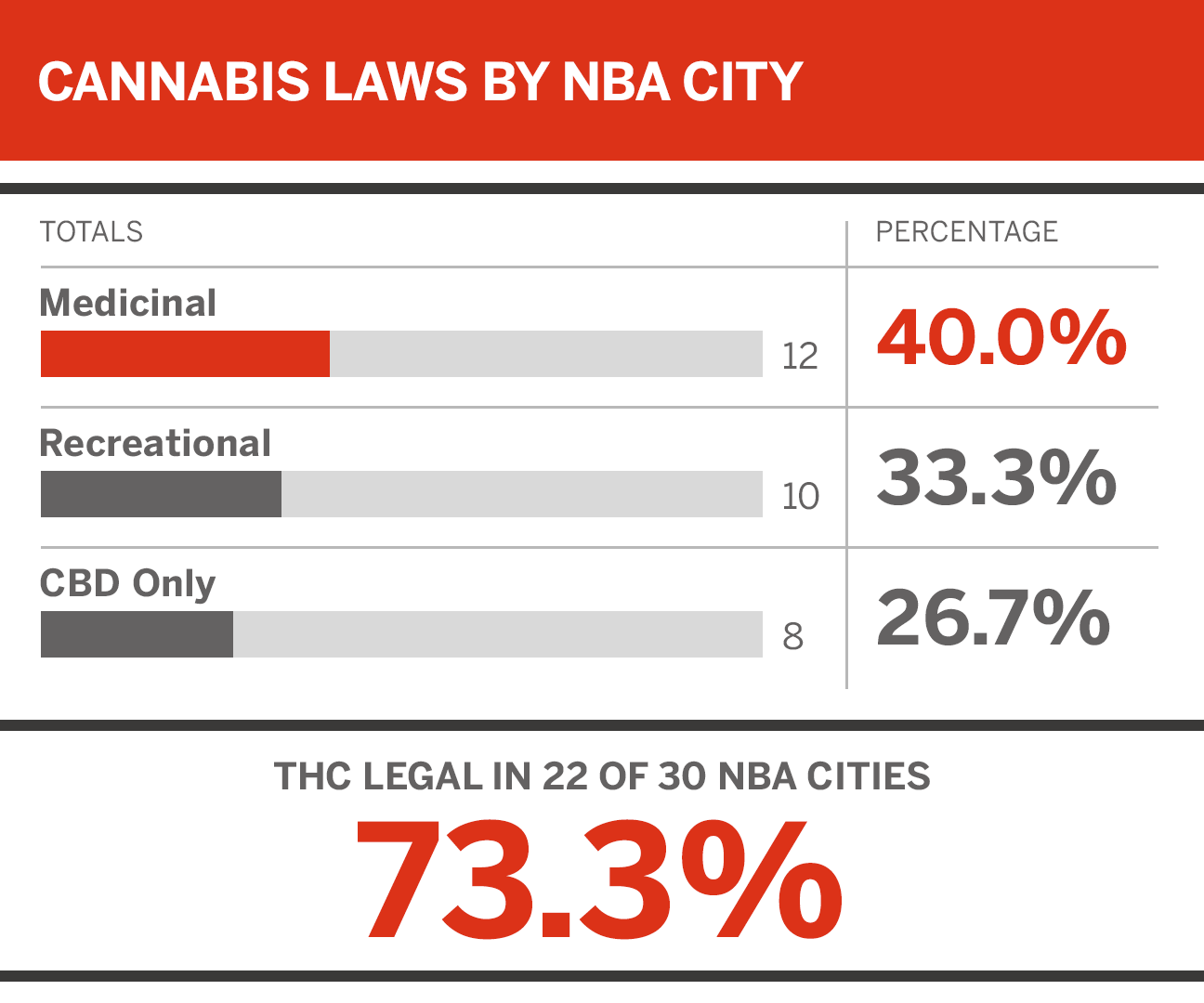
• MLB's marijuana policy is a bit different. The league does not test players for drugs of abuse. It only conducts testing on drugs such as marijuana if the MLB or union officials have "reasonable cause" to do so. MLB's threshold is 50 nanograms/milliliter. If a player tests positive, he might be subject to a treatment plan that can include progressive fines of up to $35,000 for one test. A player will be suspended only if they "flagrantly disregard the rules," or are believed to be a "threat" to fellow players' safety.
Minor league players, who are not covered in the CBA, are regularly tested and face steep fines for positive tests -- and there's little recourse. For example, in 2018, St. Louis Cardinals prospect Griffin Roberts received a 50-game suspension. "I'd like to apologize to the St. Louis Cardinals Organization and fans for violating MiLB's drug testing policy for cannabis," Roberts wrote in a tweet.
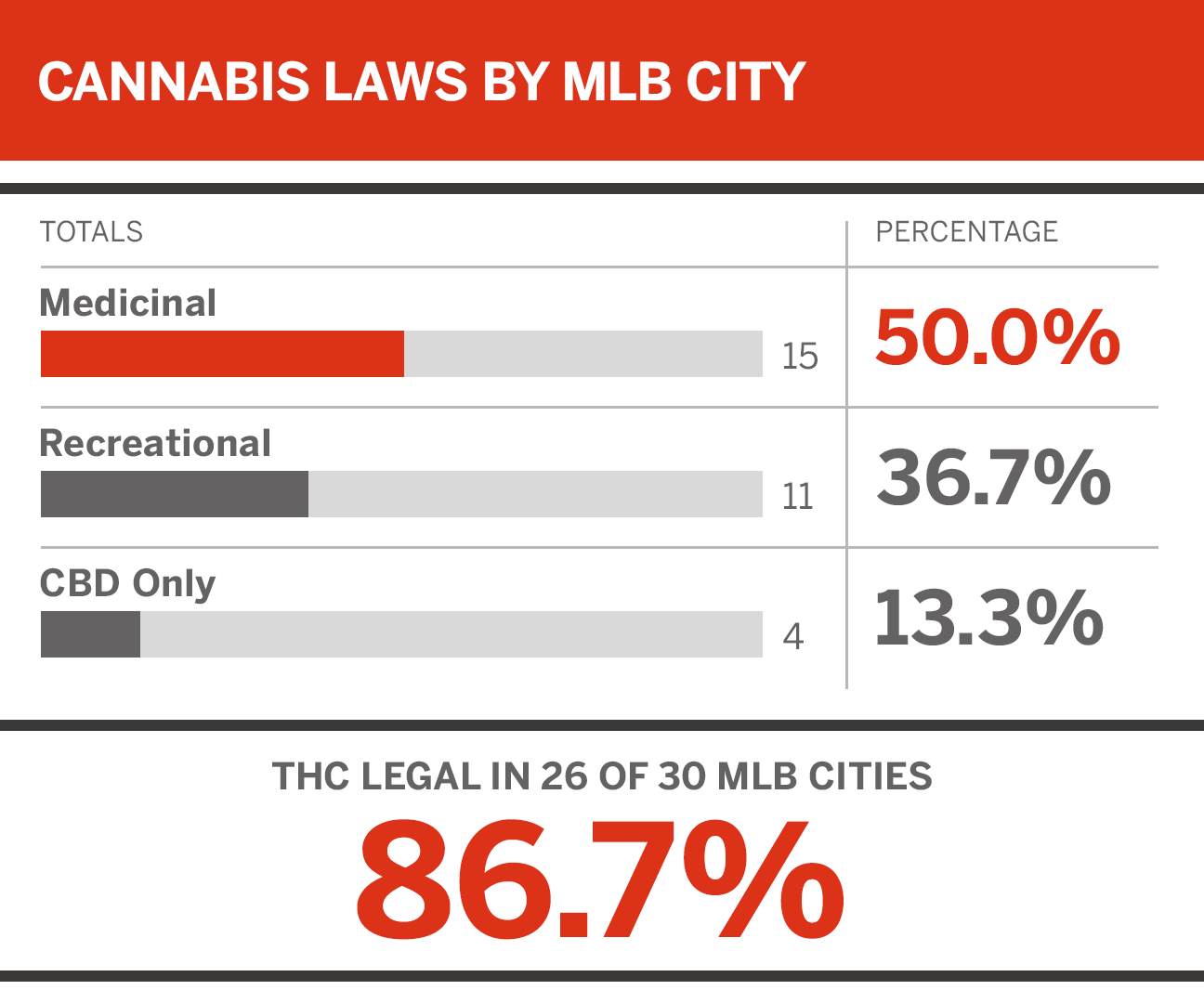
The NHL's stance? Officials from both the NHL and NHLPA say the goal of their testing procedures is not to punish offenders but rather identify those who need help and offer them help. "In today's world, I think we're largely consistent with how people are approaching these things," NHL deputy commissioner Bill Daly said. "For a program that was originally developed in 1996, when the world was a lot different, it was extremely progressive in terms of how we dealt with these issues."
Added NHLPA executive director Donald Fehr: "There's two different kinds of chemical substances, for lack of a better word. There are those that people feel can or do affect performance, and then you have others that can or may be abused. Then you have questions of legality. We live in a culture in which, when it comes to the latter thing, generationally there has been and continues to be an ongoing shift in attitudes. You want to try to reflect that. From a personal standpoint -- and this is personal -- I don't think there ought to be an intrusion into somebody's life without an awfully good reason."
How the NHL differs
How the NHL is different? Well, pretend you're Player X. He is subject to teamwide, no-notice testing once during training camp and once during the regular season. He can also be selected for random testing during the regular season and playoffs. Say his team makes the playoffs this season. He might be randomly tested, but only a maximum of 60 players are.
If the NHL or NHLPA has information including reasonable cause that he took a prohibited substance, he could also be subject to a test. Around 2,300 urine tests are taken in a given year.
So what exactly are they testing for?
Up until the 2016-17 season, all urine tests were screened for substances on the NHL/NHLPA's banned list. Then, 30 percent of those tests were given additional screening, looking for drugs of abuse -- such as cocaine or marijuana. This is called survey testing.
However, a change was made in July 2016. Now labs screen 100 percent of the urine tests for drugs of abuse. When asked for the impetus for the change, Daly said the league had wanted to do this for some time. (Any change in policy must jointly be agreed upon between the league and players' association). However, it should be noted that in October 2015, Daly said in an interview with TSN that he was concerned about the number of cocaine positives the league was seeing in survey testing.
Here's where things get interesting: Let's say Player X's test comes back positive for a drug of abuse (which it very well might considering his propensity for the weed pen). He is not going to be punished.
Dr. Dave Lewis and Dr. Brian Shaw are the physicians who run the NHL and NHLPA's joint Substance Abuse and Behavioral Health (SABH) Program. If they determine Player X's test features "abnormally high levels" of THC, they flag it. The veil of anonymity is then lifted, and the two doctors will contact Player X. They can recommend he enters the SABH, in which they'll develop an individualized treatment plan for him. Neither the NHL nor NHLPA needs to know that he's in the program.
The league won't punish Player X at all for his test. If he chooses to enter the SABH, Dr. Lewis and Dr. Shaw have the power to levy fines, suspensions or other penalties if conditions are breached. However, the player is not required to enter the program if he doesn't want to.
"The thing that we're really looking for is if there's a guy that has an issue or a problem and he needs help -- that's what we're trying to capture in that program," says longtime NHL defenseman Mathieu Schneider, now a senior executive at the NHLPA. "I do think it has worked very well. We have a tremendous amount of faith in the doctors that run the program. Confidentiality in that program is of the utmost importance."
Understanding the drug
This NHL season began with the best player in the world asking, why wouldn't you look into the benefits of marijuana?
"I say this more talking about the CBD side of it, obviously: You'd be stupid not to at least look into it," Edmonton Oilers star Connor McDavid told The Associated Press in a preseason interview. "When your body's sore like it is sometimes, you don't want to be taking pain stuff and taking Advil all the time. There's obviously better ways to do it. ... You're seeing a lot of smart guys look into it. You're seeing a lot of really smart doctors look into it. If all the boxes are checked there and it's safe and everything like that, then I think you would maybe hear them out."
But to McDavid's point, it's not as simple as smoking pot. It's important to understand a bit about cannabis. As outlined in an Oct. 16 memorandum to NHL teams -- on the eve of Canada's broad legalization -- CBD is a type of compound, called a cannabinoid, which comes from the plant cannabis sativa L. (or, as it is commonly known, marijuana). Another type of cannabinoid is tetrahydrocannabinol (THC), the primary psychoactive compound in cannabis. CBD is purported to provide certain health-related benefits, such as pain relief, while lacking the psychoactive properties of THC. In late December 2018, President Donald Trump signed the farm bill into law, essentially making hemp-based CBD oil legal. However, there are three states that refuse to abide by the federal government's classifications: Iowa, Nebraska and South Dakota.
 THC is considered a drug of abuse. If a player is tested with "high levels," he will be referred to the SABH program for evaluation. Even though CBD is not on the banned substance list, the Oct. 16 memorandum warned players that "it is not uncommon for CBD products manufactured in China, Thailand, Indonesia and Vietnam to be contaminated with drugs of abuse or prohibited substances." Therefore, players who use a CBD product might be at risk. Even with increased interest in cannabis products, the NHL did not see a need to revise its policy.
THC is considered a drug of abuse. If a player is tested with "high levels," he will be referred to the SABH program for evaluation. Even though CBD is not on the banned substance list, the Oct. 16 memorandum warned players that "it is not uncommon for CBD products manufactured in China, Thailand, Indonesia and Vietnam to be contaminated with drugs of abuse or prohibited substances." Therefore, players who use a CBD product might be at risk. Even with increased interest in cannabis products, the NHL did not see a need to revise its policy.
The NHL did not put an edict out to team doctors of Canadian-based teams of whether they can or cannot prescribe cannabis products, though it will be interesting to see whether any do, considering the consequences of carrying cannabis across international borders. Players, of course, can seek out treatment on their own outside the confines of an NHL facility.
The medical properties of cannabis are continuously being explored. Last week, the NHL alumni association signed an agreement with a Canadian cannabis company to determine whether it can help ex-players quit opioids. Over the next year, 100 NHL players in the Toronto area will participate in a double blind randomized study; if the results are encouraging, the company will fund a second study.
Future policies
Is the NHL's marijuana policy the model of the future? The NFL's CBA expires after the 2020 season, and it's believed the drug policy will be a major discussion point. The NFLPA probably will argue for something similar to the NHL's policy -- test for marijuana, but don't punish it -- and it will be worth monitoring if the NFL agrees. The NBA and NBPA have had ongoing discussions about their marijuana policy, with commissioner Adam Silver seemingly open to reform, being quoted several times as saying, "We should follow the science."
There are potential pitfalls to the NHL's policy. The league's lax attitude on marijuana is one thing. However, some have raised concerns about the same loose attitude toward other drugs of abuse. If the NHL really had concern about a cocaine problem in the league, does this policy do anything to help? What about prescription pills? One veteran NHL agent raised this point, while noting entry into the SABH is voluntary. Though the appointed doctors can highly encourage a player to enter the program, the player ultimately has the ability to say no and refuse treatment.
"It hurts to say this, because I am always on the players' side and advocating for players, and I would never advocate for a situation for a team to increase the ability to discipline a player, but there are a lot of players who act recklessly," the agent says. "I think cocaine is still a huge problem in the league. I think there are other drugs that players are abusing. If it was known the league was testing and punishing for cocaine, levels of Ambien, Adderall and a whole list of other list of drugs that get abused, I think you would naturally have players cutting down on it. Unless players face a suspension or loss of pay, what would get their attention?"
Which brings us back to Player X. "I think it comes down to this -- we are elite athletes and as long as it's not performance-enhancing or illegal, we know what's best for our own bodies," he says. "I find that a couple hits of weed at night is good for me. It's legal, it's natural, I don't see anything wrong with it."
